Richard II
William Shakespeare
The Pear Theatre in Co-Production with Perspective Theatre Company

Over four hundred years later, the plays of William Shakespeare often seem as if the Bard is writing about current events, recurring dilemmas, and a foreboding future of the 21st century. That is particularly true in 2023 as The Pear Theatre presents Richard II in a co-production with Perspective Theatre Company. Shakespeare’s history of a king whose power has gone to his head to the point he believes himself invincible and even divine, of a challenger who speaks the language of the people and wins them to his side, and of a transition of power where hot-blooded followers take matters into their own hands after hearing what is taken as a call to arms by their new leader – all and much more smack of the issues that currently are all but tearing apart the very foundation upon which our own country was founded. With a cast of six playing a total of nineteen roles, the Pear and Perspective’s Richard II is not only timely but is a tour de force by an exceptionally talented cast under the masterful, keen-eyed direction of Kevin Hammond.
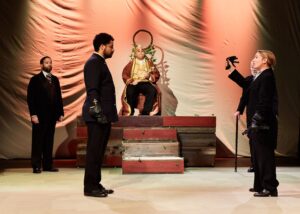
Shakespeare opens his play in the last couple of years of King Richard II’s twenty-two-year reign. The King is presented a dispute by two of his Dukes, Bolingbroke and Mowbray, with the former accusing the latter of killing his uncle, the Duke of Gloucester. A conflict-deciding duel of swords between the two is stopped by the King. He abruptly chooses to banish the two from England – Mowbray for life and Bolingbroke for six years. Bolingbroke’s lesser sentence is in deference to Bolingbroke’s aged father and Richard’s uncle, John of Gaunt, who is convinced that his brother, Gloucester, was actually murdered by his nephew, the King himself.
Angered resentments only grow more intense when Richard takes the opportunity to seize all of John of Gaunt’s (and thus Bolingbroke’s) lands and possessions after the ancient dies. From Richard’s standpoint, he is God’s chosen and has heaven’s blessing in all he does. From the perspective of the banished Bolingbroke and increasingly of many others who agree with him, the King has usurped his rights as sovereign while ignoring the rights of his subjects and thus should be deposed – something Richard cannot imagine actually happening, believing he is of divine blood.
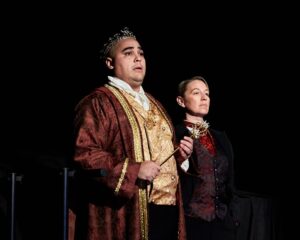
In the opening scenes, John R. Lewis superbly embodies a King whose ego has overtaken his ability to govern justly. With eyelids that flutter, a walk that often struts, and a scepter held as if a magic wand ready to make another’s life better or worse according to his royal mood, this Richard is all about himself, first and foremost. “We are not born to sue but to command,” he asserts to his aged Uncle, accompanied by just one of his host of expressions full of smirks, rolling eyes, and pursed lips that make evident just how he feels about anyone less than he – which includes everyone. John Lewis’s Richard is a King whose head is usually cocked just enough heavenward so that his eyes gaze downwards on all those he clearly feels less than he.
Even as Bolingbroke has returned to England’s shores to be greeted by a host of dukes, earls, and their forces all ready to enable a forced change of rulers, Richard blindly hangs desperately onto the belief that who he is makes defeat impossible. “Am I not king?… Is not the King’s name twenty thousand names? Arm, arm, arm, my name!”
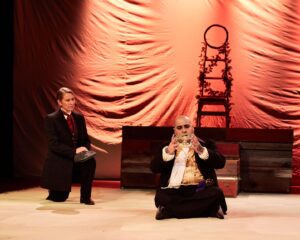
But as reality truly begins to set in, we see this Richard sink to the ground, take off his crown, and recite “sad stories of the death of kings,” realizing that he is soon to be yet one more in a long line of England’s deposed sovereigns. In demeanor and voice, John Lewis vividly portrays the fall of Richard; yet as the King later alludes to himself as betrayed – like Jesus – by an army of Judas’s, he to his dying breath hangs on to his divine, all-righteous self-view.
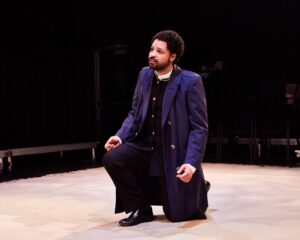
introduces his Bolingbroke as hot-headed and cocky, exploding harshly his spoken consonants as if arrows to pierce Mowbray, whom he accuses of murder. Once banished and as he reenters the country and moves toward the moment he is crowned, his Bolingbroke acquires a much more calm, stately presence, speaking with force but not with his once youthful brashness. At one point when he looks at Richard’s now empty throne, his gaze is less of desire than of some dread at the responsibility he is about to assume. The contrast between this Bolingbroke and Richard, his predecessor, is palpable and well-conceived by both actor and director.
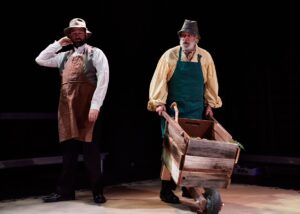
The other, four cast members transform their personas often dramatically and within seconds, each to portray three-to-five characters of varying ages, societal standings, and even sexes. Julian Lòpez-Morillas particularly is impressive as the old and sick John of Gaunt, whose strength of character and inner dignity is not diminished but rather enhanced by his cane-supported walk and voice of breathy gravel. His Act Two foretelling of Richard’s demise (“For violent fires soon burn themselves out”) is a stunning moment, only to be surpassed as he uses his nearing time of death to pour forth a diatribe against the listening Richard (“Landlord of England art thou now, not King”). As a wheelbarrow-pushing gardener in a later scene, the same actor becomes a spry, truth-telling man of the land who notes to a fellow servant that “if he [Richard] had tended this land as we do this garden,” things would have gone much different for the King and for England.
William J. Brown III, besides playing both a servant and Sir Stephen Scroop, is a Duke of York (uncle to the King) who takes little caution in hiding his contempt for Richard, especially when he compares the King to his predecessor and grandfather, Edward III. His York is a man of careful, outward restraint as he makes his comparisons, with arms kept at his side and a body almost statuesque but also with eyes opened wide and fierce to match a voice that cuts with its evaluative, non-masked remarks. And yet, he is not one to betray the legitimacy of the ordained king, equally providing Bolingbroke his dispassionate but pointed disapproval of the Duke’s illegal return from banishment: “Why have those banished and forbidden legs dared once more to touch a dust of England’s ground?” William Brown’s York is a finely polished portrayal of a man torn to his core as he attempts to hang on to the belief that the King’s office should not be challenged even as he sees and is disgusted by the current placeholder.
As strong as these previous four performances are, the real stars of the evening are two women actors who play everything from queen or lady-in-waiting to Dukes both loyal to or plotting against the king to servants or sea captain. As Mowbray, Jennifer Le Blanc is deliciously snide and smug as his rival, Bolingbroke, throws an initial list of accusations toward him; but that reaction becomes pointedly more sharp and ready for sword-drawn revenge as Mowbray’s ire rises. The same actor’s Duke of Aumerle (son of Duke of York) is a loyalist to the end of the King, until he is not. A director’s surprising alteration to the original script’s climax offers the fine actor an additional moment to show skill and prowess as well as provide this version of Richard II with a clever commentary and comparison to other, more modern switches and betrayals of political loyalty.
With three other, ever-switching roles, Jennifer Le Blanc is constantly changing just enough costume, voice accent/tone, and physical stance to transform flawlessly and seamlessly among her much-varied characters.
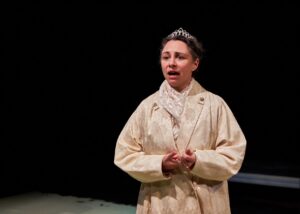
The same and more can be said of Annamarie MacLeod whose one of five roles is as Richard’s wife and Queen. One can feel the utter shock and disbelief the Queen has upon hearing from a Gardener that her husband has lost all his loyal followers (“Am I the last that knows it?”) as well as experience with her the utter heartbreak as she watches her King shatter a mirror while crying “Good king, great king, but yet not greatly good.” Beyond her Queen and among other roles, Annamarie MacLeod is also outstanding as a slump shouldered, heavily accented Welsch, sea captain and as the grieving and bitterly angry widow of the murdered Gloucester.
Beyond the cast itself, much of the credit for the success of this production is due to the guidance of its director, Kevin Hammond. The many scenes of the five acts played by such a minimum number of actors flow one from the other without a moment’s pause. Decisions like a King’s scepter switching from a bejeweled wand to a stick topped with a pinecone demonstrate vividly the ruler’s demise in subtle but powerful ways. Having Bolingbroke and Mowbray’s lines overlap each other during their initial argument and heated slew of accusations highlights the futility of the encounter and their joint inability to hear or care to hear the other.
Director Hammond and lighting designer, Adrian Gilstrap, combine their skills to a cell outlined in harsh light on the floor in which an imprisoned King stands and bemoans, “I wasted time, and now doth time waste me.” From the light above, his body’s shadow becomes a mere drop of dark shape next to his feet. As his reign and life wanes, so does even his shadow.
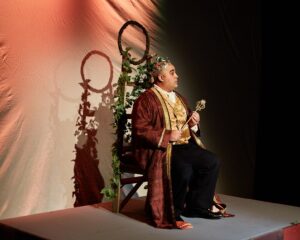
Louis Stone-Collogne’s sparse set design is another powerful symbol of Richard’s decaying reign. His meager, skeleton-like throne sits on a platform of decaying wood with gaps and holes in its structure. The open arena stage with audience on three sides is bordered ominously by black splatters of paint, more signs that things do not bode well for the kingdom before us.
Joanne Martin’s sophisticated array of costumes are modern yet still of yesteryear of the 1920s or ‘30s, offering a bridge from the time of Shakespeare to our current era. Simple additions of an ascot, vest, shawl, hat, or overcoat aid instantaneous switching of roles and yet enable audience to distinguish characters as the play progresses.
Richard II – a play that is less performed than many of Shakespeare’s thirty-seven and one that is of history long ago – is powerfully presented by this joint production of The Pear Theatre and Perspective Theatre Company. The two-hour, one intermission sequence of scenes command the audience’s full, enthralled attention and provide us much food for thought as recent and current elections, transitions, and powerplays of our own country readily come to mind.
(This review is based on my attending out of necessity the final preview before the formal opening, as agreed by the performance’s director and the company’s press agent.)
Rating: 5 E
A Theatre Eddys Best Bet Production
Richard II continues through March 26, 2023 in a co-production between The Pear Theatre Perspective Theatre Company at The Pear, 1110 La Avenida, Suite A, Mountain View, CA. Tickets are available at https://www.thepear.org .
Please note: Patrons must both show upon entry proof of COVID vaccination and wear masks during the performance.
Photo Credits: Gregg Le Blanc
